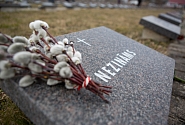
On Thursday, 7 May, the Saeima adopted a statement on the 75th anniversary of the end of the Second World War and the need for a comprehensive view in Europe and on a global level. It emphasises that Europe cannot be united as long as its collective memory remains divided and expresses concerns about the attempts of historical revisionism regarding the Second World War on the part of Russia.
The Saeima maintains that it is necessary to promote a comprehensive view of history in order to prevent the resurgence of totalitarian regimes; to protect the sovereignty and independence of all European countries; to strengthen the unity of Europe and the European citizens; as well as to promote a common view of the crimes committed by the totalitarian Nazi and communist regimes.
In the statement, the Saeima expresses regret that the Russian Federation, as the legal successor of the Soviet Union, still refuses to recognise the Soviet Union’s aggression against the Baltic States and continues to justify their occupation and illegal annexation. The Saeima also voices concern about the attempts of historical revisionism on the part of Russia to serve its interests by rejecting critical examination of the role of the Soviet Union and implementing an aggressive disinformation campaign that obstruct a common view of the international community on the course and outcomes of the Second World War.
Members of the Saeima call for respect for each individual and family in Europe regarding their experience of the War, condemning the Nazi and communist regimes and all crimes committed by these regimes in a consistent and balanced way. Only by remembering the injustices of totalitarianism and honouring the victims of the Second World War is it possible to surrender the remnants of the past, thus strengthening democracy, peace, and stability in Europe and the entire world, as set out in the statement adopted by the Saeima.
“Remembrance is what is necessary to assess the past adequately and comprehensively, while intentional forgetting hinders the process. This concerns not only the inhabitants of Latvia but Europe in general where different memory cultures and historical memories still coexist. It is high time for us to speak openly and confidently about our past. Because only by means of a common understanding, a true understanding and not just a formal box-ticking exercise, will a truly united Europe be possible with sincere, open, equal and lasting ties among countries and nations,” underlined Rihards Kols, Chair of the Foreign Affairs Committee of the Saeima.
Kols emphasised: “We have to repeat, reaffirm and remind what we already know. Including the fact that crimes against humanity do not fade to oblivion – there is no statute of limitations for these crimes, and the attempts to deny them or make them sink into irrelevance only solidify them in our conscience without any chance of reconciliation.”
Saeima Press Service







